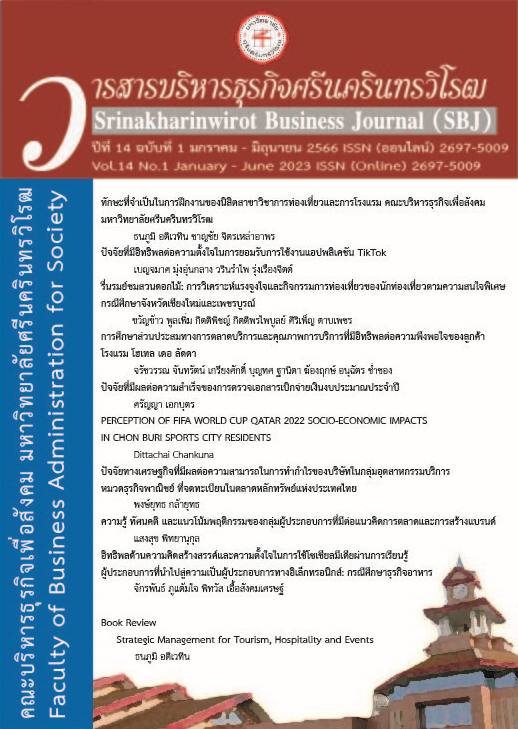ENTREPRENEURIAL KNOWLEDGE, ATTITUDE AND PRACTICE OF MARKETING AND BRAND BUILDING CONCEPTS
ความรู้ ทัศนคติ และแนวโน้มพฤติกรรมของกลุ่มผู้ประกอบการ ที่มีต่อแนวคิดการตลาดและการสร้างแบรนด์
Keywords:
Knowledge, Attitude, Practice, Marketing and brand building, EntrepreneurAbstract
This research studied entrepreneurial knowledge, attitudes and the intention of entrepreneurs to implement marketing and brands concepts. Quantitative survey research was done for cross-sectional description with data collected by questionnaire. The population was 400 entrepreneurs working in Bangkok and other regions of Thailand. Data was statistically analyzed by percentage, mean, standard deviation, and inferentially by the Pearson product-moment correlation coefficient. Results were that samples had average scores for marketing concept and brand building knowledge of moderate level. Attitudinally, samples had positive attitudes in strong agreement at an average of 4.41. In terms of practice, samples group had high level intention to apply marketing and branding concepts to their businesses, with a mean of 4.52. In addition, marketing concept and branding knowledge was related to attitude at a significance level of .001 in all aspects, including entrepreneurial attitude toward marketing concepts and branding correlated with practice, in terms of intention to apply marketing concepts to businesses and brand buildingDownloads
References
กิตติพงษ์ โสภณธรรมภาณ และอัควรรณ์ แสงวิภาค. (2558). ทัศนคติและความเข้าใจของผู้ประกอบการวิสาหกิจขนาดกลางและขนาดย่อมต่อแนวคิดด้านโลจิสติกส์การตลาด. วารสารวิชาการศรีปทุม ชลบุรี, 11(4), 29-38. https://www.google.com/url?sa=i&rct=j&q=&esrc=s&source=web&cd=&ved=0CDgQw7AJahcKEwjQhuLKrOiAAxUAAAAAHQAAAAAQAw&url=https%3A%2F%2Fwww.chonburi.spu.ac.th%2Fjournal%2Fbooksearch%2Fupload%2F1405-005_attitude.pdf&psig=AOvVaw0-3NRK7olNw3JLkgwvCgXR&ust=1692521535575540&opi=89978449
กรมพัฒนาธุรกิจการค้า. (2565). การจดทะเบียนธุรกิจประจำเดือนกรกฎาคม 2565. จาก https://www.dbd.go.th/ download/document_file/Statisic/2565/H26/HS26_202307.pdf
ดลชัย บุณยะรัตนเวช. (2555). สร้างแบรนด์ สิ้นแบรนด์ A-Z. สำนักพิมพ์กรุงเทพธุรกิจ.
ราชกิจจานุเบกษา. (2561). ยุทธศาสตร์ชาติ (พ.ศ. 2561- 2580). เล่ม 135 ตอนที่ 82 ก ประกาศวันที่ 13 ตุลาคม 2561.
ราชกิจจานุเบกษา. (2560). ประกาศคณะกรรมการนโยบายการบริหารงานจังหวัดและกลุ่มจังหวัดแบบบูรณาการ เรื่องการจัดตั้งกลุ่มจังหวัดและกำหนดจังหวัดที่เป็นศูนย์ปฏิบัติการของกลุ่มจังหวัด (ฉบับที่ 3),เล่ม 134 ตอนพิเศษ 281 ง, 14.
วิทยา จารุพงศ์โสภณ. (2558). กลยุทธ์การบริหารแบรนด์. แปลน สารา.
วรวุฒิ พันธาภา และจิระเสกข์ ตรีเมธสุนทร. (2565). ความสัมพันธ์ระหว่างความรู้ ทัศนคติต่อการเป็นผู้ประกอบการกับคุณลักษณะความเป็นผู้ประกอบการของนักศึกสถาบันอุดมศึกษาเอกชนในเขตกรุงเทพมหานคร. วารสารวิชาการเซาธ์อีสท์บางกอก, 8(1), 19-32. https://so05.tcithaijo.org/index.php/SB_Journal/article/view/249862/173875
ศิริกุล เลากัยกุล. (2564). เผยเคล็ดลับการสร้างแบรนด์ที่ยืนหยัดได้อย่างยั่งยืน. จาก http://blog.infoquest.co.th/iqmedialink/brand-sustainable/
สุชาติ ไตรภพสกุล. (2565). หลักการตลาดเพื่อการเป็นผู้ประกอบการ. สำนักพิมพ์จุฬาลงกรณ์มหาวิทยาลัย.
เหมือนจิต จิตสุนทรชัยกุล. (2565). การบริหารแบรนด์. ม.ป.พ.
Aebi, V., Sabato, G., & Schmid, M. (2012). Risk management, corporate governance, and bank performance in the financial crisis. Journal of Banking & Finance, 36(12), 3213-3226. https://doi.org/10.1016/j.jbankfin.2011.10.020
Ajzen, I. (1991). The theory of planned behavior. Organizational Behavior and Human Decision Processes, 50(2), 179-211. https://doi.org/10.1016/0749-5978(91)90020-T
Beechler, S., & Javidan, M. (2007), Leading with a global mindset. Advances in International Management, 19(131-169). 10.1016/S1571-5027(07)19006-9
DOI:10.1016/S1571-5027(07)19006-9Caird, S. (1988), Review of methods of measuningenterp rise attributes. Unpublished paper, Durham University Business School.
Carlson, J. G. (1985). Recent assessment of the myers briggs type indicator. Journal of Personality Assessment, 49(4), 356-365. https://doi.org/10.1207/s15327752jpa4904_3
Chaston, I. (2015). Entrepreneurial marketing: Sustaining growth in all organizations (2nd Ed.). Macmillan International Higher Education.
Crant, J. M. (1996). The proactive personality scale as a predictor of entrepreneurial intentions. Journal of Small Business Management, 34(3), 42-49. https://www.researchgate.net/publication/247954830_The_Proactive_Personality_Scale_as_a_Predictor_of_Entrepreneurial_Intention
Dweck, C. S. (2006). Mindset: The new psychology of success. Random House Publishing Group.
Fishbein, M., & Ajzen, I. (1975). Belief, attitude, intention, and behavior: An introduction to theory and research. reading, addison-wesley.
Gupta, A. K, & Govindarajan, V. (2002). Cultivating a global mindset. Academy of Management Executive, 16(1),116-126. https://www.jstor.org/stable/4165818
Gurel, E., & Altinay, L., & Daniele, R. (2010). Tourism students’ entrepreneurial intentions. Annals of Tourism Research, 37(3), 646-669. https://doi.org/10.1016/j.annals.2009.12.003
Gürol, Y., & Atsan, N. (2006), Entrepreneurial characteristics amongst university students: Some insights for entrepreneurship education and training in Turkey, education + training, 48(1), 25-38. https://doi.org/10.1108/00400910610645716
Hjalager, A. M. (2010). Progress in tourism management: A review of innovation research in tourism. Tourism Management, 31(1), 1-12. https://doi.org/10.1016/j.tourman.2009.08.012
Javidan, M., Steers, R. M., & Hitt, M. A. (2007). The Global mindset. https://www.semanticscholar.org/paper/The-Global-Mindset-Javidan-Steers/0c0f205ed88c80f1679f4db08de376e7b9c251 eb#references
Morrish, S.C. (2011). Entrepreneurial marketing: a strategy for the twenty‐first century. Journal of Research in Marketing and Entrepreneurship, 13(2), 110-119. https://doi.org/10.1108/14715201111176390
Mueller, S. L., & Thomas, A. S. (2001). Culture and entrepreneurial potential: A nine country study of locus of control and innovativeness. Journal of Business Venturing, 16(1), 51-75. https://doi.org/10.1016/S0883-9026(99)00039-7
Peterman, N. E., & Kennedy, J. (2003). Enterprise education: Influencing students’ perceptions of entrepreneurship. Entrepreneurship Theory and Practice, 28(2). https://doi.org/10.1046/j.1540-6520.2003.00035.x
Phan, H. P., & Maebuta, J., & Dorovolomo, J. (2010). The relations between personal epistemology and learning approaches in sociocultural contexts: A theoretical conceptualization. The International Journal of Learning: Annual Review, 17(5), 465-478. https://doi.org/10.18848/1447-9494/CGP/v17i05/47033
Rogers, E. M. (1983). Diffusion of Innovations. (3rd ed). Free press.
Robinson, P. B., Stimpson, D. V., Huefner, J., & Hunt, H. K. (1991). An attitude approach to the prediction of entrepreneurship. Entrepreneurship Theory and Practice, 15, 13-31. 10.1177/104225879101500405
Scott, M. G., & Twomey, D. F. (1988). The long-term supply of entrepreneurs: students’ career aspirations in relation to entrepreneurship. Journal of Small Business Management. 26(4), October, 5-13. https://www.proquest.com/docview/221002129
Shariff, M. N. M., & Saud, M. B. B. (2009). An attitude approach to the prediction of entrepreneurship on students at institution of higher learning in malaysia. International Journal of Business and Management, 4(4), 129-135. 10.5539/ijbm.v4n4p129
Skyword. (2020). How the marketing funnel works from top to bottom. https://www.skyword.com/contentstandard/how-the-marketing-funnel-works-from-top-to-bottom/
Story, J., & Barbuto, J. E. (2011). Global mindset: A construct clarification and framework. Journal of Leadership & Organizational Studies, 18(3), 377-384. 10.1177/1548051811404421
Thomas, L. C., Painbéni, S., & Barton, H. (2013), Entrepreneurial marketing within the French wine industry. International Journal of Entrepreneurial Behavior & Research, 19(2), 238-260. https://doi.org/10.1108/13552551311310392
Trisetiyanto, A. N., Syamwil, R., & Widjanarko, D. (2019). The influence of young entrepreneur school (YES) training model on knowledge, attitude and employee skills competence. Journal of Vocational and Career Education, 4(2). https://doi.org/10.15294/jvce.v4i2.26793
Zhao, F. (2005), Exploring the synergy between entrepreneurship and innovation. International Journal of Entrepreneurial Behavior & Research, 11(1), 25-41. https://doi.org/10.1108/13552550510580825
Downloads
Published
How to Cite
Issue
Section
License

This work is licensed under a Creative Commons Attribution-NonCommercial-NoDerivatives 4.0 International License.
วารสารบริหารธุรกิจศรีนครินทรวิโรฒ ยินดีรับบทความวิจัยและบทความทางวิชาการด้านบริหารธุรกิจ เพื่อพิจารณาตีพิมพ์เผยแพร่ในวารสาร ซึ่งทัศนะและข้อคิดเห็นใดๆ ในวารสารฯ ถือเป็นความคิดเห็นและความรับผิดชอบโดยตรงของผู้เขียน มิใช่เป็นความคิดเห็นและความรับผิดชอบใดๆ ของคณะบริหารธุรกิจเพื่อสังคม มหาวิทยาลัยศรีนครินทรวิโรฒ ผู้ประสงค์จะนำบทความหรือบทวิจารณ์ใดๆ ไปเผยแพร่ จะต้องได้รับการอนุญาตจากวารสารเป็นลายลักษณ์อักษร ลิขสิทธิ์บทความที่เผยแพร่ทั้งหมดเป็นของวารสารบริหารธุรกิจศรีนครินทรวิโรฒ






